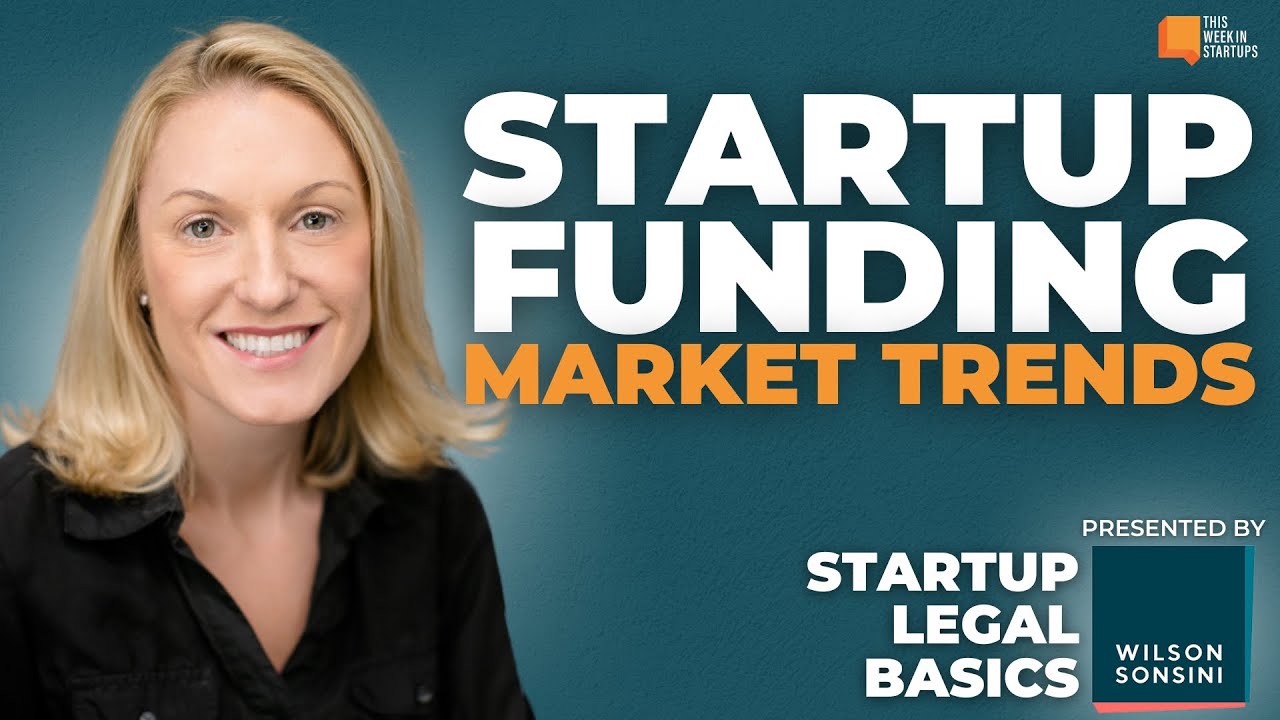Hey everybody welcome back to this week In startups it's time for our startup Basic series now when we do this series Sometimes you're nervous to ask basic Questions so I bring in my friend Becky Degra she's at Wilson sincec wsgr you Know that firm they're famous they do a Really great job they're hardworking and Becky and I have been doing this for Five or six years now and we love doing It right because this is we have to Repeat ourselves all the time with the Basics and so we'd like to get the Basics out there for people to Understand absolutely thanks for having Me let's just start with our market Update we're sitting here at the halfway Mark it's halftime in Silicon Valley as It were after two years of absolute Chaos in the market Silicon Valley Bank And First Republic and you know all this Chaos you know down rounds after Peak Zer what's the state of the market today In terms of startups and funding And all of this uh indigestion in the Market we saw Peak valuations and large Amounts of money being invested now we See this down Market lots of headwinds But Signs of Life obviously and a lot of New investment occurring in AI so what What are you seeing from behind the desk At the table with you know these ATS Scale startups and even the small ones Yeah absolutely that overview is perfect
Right I mean we were on a heck of a tear There for a number of years right of Just up up up 2020 was kind of the top Of that maybe first half of 2022 and Then we started seeing things change and You know last year was a was a really uh Different story to tell from the 10 Prior years this year the best word to Describe it I think is just choppy we See a lot of things still happening a Lot of action still going on Particularly at the C to a stage I would Say that um side of the market is still Strong we are starting to see in the Last six months movement on the growth Equity side which is great like last Year growth equity and when I talk about Growth Equity I'm really talking about Kind of very late stage financings Pre-ipo type financings last year that Was almost silent there was so little Activity and we're we're we're seeing More things happen there and that kind Of makes sense because it corresponds to I wouldn't say the IPO Market is Gang Busters or anything but we are starting To see some green shoots there and as we Start to see that it trickles down the Equity picks up than you know other Parts of the market do as well the seed In the a stage because they're so far From the IPO that's why we continue to See those um stay strong and even in That regard right like the valuations
Are still quite high and they are still Trending up ticking up from even 2021 Levels the amounts being raised are also Ticking up I will put a little Aster Over that though and that a lot of that Is being driven by these really huge AI Deals that the valuations are really out There and the amounts being raised in Which case right is bringing the Averages up but we have looked at the Data of pulling out those outliers I'll Call them and say what does the rest of The data look like and the cay Market Still feels really strong yeah makes Sense because entrepreneurs are always Going to start great companies y Combinator our accelerator the launch Accelerator Tech Stars they're going to Still incubate companies and so you know That part of the market doesn't require Massive amounts of capital and that Money is kind of locked in to venture Funds and ready to be spent but the Later stage stuff that's a little more Complex yeah absolutely yeah and one Thing that we're literally in the middle Of right now is the summer slowdown you Know traditionally July August we start Seeing things slow down people are Taking their vacations whether that's The management teams the VCS right and It just takes longer to get attention Longer to get traction longer to get the Deals done
But even outside of the summer period we Have seen just longer deal Cycles it's Not the 2021 days where was like you Sign a term sheet and we're closing in 2 Weeks we're kind of back to the norm I Would say four to 6 weeks for your first Preferred stock Financing obviously if we're talking About saves that can be much faster um Or convertible notes but but if you're Talking about your preferred stock round Four to 6 weeks is definitely what you Should count on from the time that you Sign the term sheet to closing to Actually getting the money in which is Healthy and good right people are taking The time to doe diligence they're taking The time to pick a partner well so if You're an entrepreneur I guess the best Advice is to make sure you have Time um and Runway to close these deals Because the concept of the 48 hour you Know uh speedrun where you do this blitz C fundraising and nobody gets to do Diligence and nobody gets information Rights and there's no change in Governments all of that kind of what I Considered unhealthy um and just bad Hygiene that's gone but it's hasn't been Replaced with NeverEnding fundraising It's you know people are still I Wouldn't say a blitz cre but a Brisk Pace for good deals it's still a Brisk Pace correct yeah absolutely and I say
This all the time that good companies Are still getting financed at all stages Right maybe the is not being handed out Like candy on Halloween but there's the The good companies are still getting Plenty plenty of of deals are happening And if you look at the amounts that Funds raised I mean 2020 was Record-breaking 2021 was record-breaking 2022 was record-breaking even though Half the year you know was considered You know part of this kind of new down Market so there's so much money in these Funds that need to be deployed that need To get out out there you know they're They're dedicated particularly like the Early stage funds they're dedicated to Doing the early stage deals they've got To do them so they're looking for for Good companies to invest in and you know As far as his early stage investor is Concerned I uh think that this is going To be one of the great vintages because Anybody crazy enough to start a company In a slow Market in a challenged Market Generally we see less tourism less Tourists more serious people and maybe Even a consolidation of talent in the Management teams so I think it's going To be wonderful vintage for Venture Because the seriousness the ruggedness The resiliency of this cohort of Entrepreneurs feels distinctly different To me than the ones we saw funded in
Some cases not all in 19 and 20 and 21 So let's talk about down rounds let's Define what a Down Round is um and then You know a lot of these terms people Hear anti-dilution pay to playay and Recaps let's let's define all of these These are important terms for Founders To know yeah so let's start with down Round really all that is is you're Selling stock today at a price per share Less than what you originally sold your Outstanding preferred stock let's say You have series a you sold it at a Dollar per share anything that you're Selling your series A-1 or B or whatever We're going to call it at less than a Dollar per share it's going to be Considered a Down Round so what does Down rounds do it triggers anti-dilution Like when you signed up to those Financing documents it's out of the Couple hundred of pages of documents That got put in place at that time one Of them relates to anti- delusion that Says as an investor hey if you sell Shares at less than what you paid or Less than what I paid then I get an Adjustment now one common misperception About anti- delusion adjustments is oh The investor gets more shares Technically the investor does not get More shares of preferred stock what Happens is the conversion rate at which The preferred stock converts to common
Stock just gets adjusted so every share Of preferred stock is convertible into One share of common stock that's the Default when the preferred stock is Issued and let's just say there is an Anti-dilution adjustment there is a Down Round where we sell stock and we adjust That conversion ratio that one share of Preferred stock you still only have one Share of preferred stock but it now may Be convertible into 1.05 shares of common stock or whatever The number is and there's a whole Formula for determining what that Adjustment is going to look like and That conversion all happens on exit or IPO on exit or IPO technically preferred Stock can convert to common stock at any Time voluntarily but there's no reason That you would unless there was an exit Or an IPO the voting rights do change Because almost all of your preferred Stock votes are done on an ason Converted basis so even though I have One share of preferred stock when I'm Voting amongst all the other classes of Preferred stock I would get that in my Example 1.05 votes for each share that I Have but otherwise it doesn't really Come into play unless the preferred Stock converts the other thing about Anti-dilution is that it can be waved Right so your existing preferred Stockholders could wave having that anti
Uh uh dilution adjustment even kick in And sometimes we see that sometimes we Don't it all depends on you know the Circumstances as to what's going on and Who's leading and all that good stuff And the founders have to then go ask the Investors hey you backed us three four 5 Years ago now we want you to wave this Even though you were the earliest Investors who believed in us and then These new people are getting a better Deal than you what is the best way to Communicate that to get a chance of the Investor to say yes what is the best Argument people make and and sometimes People ask you hey Becky how do I tell Jakal that I need him to to take the Haircut not the new people yeah a lot of Times it's the new investor that's Saying you got to get this waved in Order for this whole thing to work Because often times Well vast majority Of the time like when we are doing these Down rounds it's Insider lead so it may Not be the earliest investor that came In but it it is likely an investor on The cap table is the one who's who's Coming to the table we don't often see a Lot of new investors coming to the table To lead a down R not to say that it Doesn't happen it does but vast majority Of the time it really is Insider Le and A lot of times it's okay I'm not putting The money in unless we can set the
Company up in such a way that post Financing we're going to be able to go Out and raise when we need to at the Next financing round and so often it's Really trying to look ahead to what is That next financing going to be and what Do we need the company to look like how Do we rightsize the cap table do we need To incentivize people to participate and That's when we get into all the other Terms of do we use a pay to play do we Do a recap do we not right so there's Multiple levers here one of them is hey Get everybody to wave their Anti-dilution so that the founders Retain more ownership the existing Investors who aren't investing in the New round take a little bit of a haircut But they're still in the game But they didn't want to pay extra money To keep the company going so therefore That's where pay to play comes in you Either put more money in and it's Typically at you know your existing Ownership so if you owned 5% as a seed Fund you know and they're raising a Million okay 5% of a million is 50,000 So we need you to put in 50,000 to pay To play if not your original 5% Ownership's going to you know maybe take It on the chin yeah yep and the whole Point of the pay to play not not every Down Round has has to have one really The reason that you would put it in
Place is you you need other investors to Come to the table and you may have one Or two insiders that say okay I'm Putting money in and I'm going to put Together we're going to put 10 million In but the company needs 15 million to Get to the next Milestone and I'm not Putting my 10 in unless I know the Company's going to get to that minimum Amount because otherwise you're not Going to do anything with my 10 million So then they'll say well if other folks Around the table aren't willingly to Step up we're going to put a mechanism In place to essentially you if you don't Play something bad is going to happen And there's all sorts of something bad You know most times the something bad is You get converted we're just talking About preferred stock converting to Common stock most of the time the way That we do this is to say if you don't Participate to your full prata Percentage then all of your preferred Stock is going to get converted to Common stock and you lose all of your Preferred rights now you can do that on A one toone basis you can do that on a Something else like a 10 to one so for Every 10 shares of preferred stock you Have you're only going to get one share Of common stock right if we have a Really big uh decrease in valuation and We and this is often times where a
Recapitalization is coming into play in Connection with that pay to play is it May be well we've got enough insiders Who are willing to participate and in Fact we do this pay to play if you Particip to pay you get to keep your Preferred stock which means the Liquidation preference the liquidation Stack that goes along with that Preferred stock stays in existence if it Turns out that your liquid that your Total liquidation stack is higher than Your new valuation that's not really Setting the company up or a good spot Come next financing so in that case That's where we will start trying to you Know mess with those ratios to say even If you do participate you're only going To get a tenth of a pull-up or 25 % Pullup or whatever it might be and this Is why a lot of firms if there's a Recapitalization A payto playay or a Down Round they just don't participate Because as venture capitalist as seed Funds you have your choice of investing In the next company that you know has All the promise of a clean cap table and A new idea and then you have this other Company maybe they've hit five or 10 Million in Revenue but you have this Very hard discussion that has to occur And a lot of VCS uh you know when I talk To them privately I just don't want to be involved in the
Bad feelings it's a lot of bad feelings A lot of people get hurt you know as a Seed fund Becky we will be faced with Situations where hey this is happening We own 10% of the company we've made Four investments in it over five years And now we're getting wiped down from You know 10% ownership to 10 basis Points you know one tenth of 1% we're 99% of our value is being wiped down and Have to say hey wait a second this Doesn't feel exactly Fair can we can we Get somewhere between 1% and 100% of What we did here to help the company but You know it's it's a difficult Conversation because the company is in Many of these cases destined for either A zero or a very small outcome and so This is where people you know might feel Like they're putting U good money after Bad they made a Bad Bet on the first and Now they feel like they have good money Here and or it could be bad money after Good you know there's all kinds of Scenarios and it's just really difficult So if you get yourself in this situation Yeah the management team has to look at Themselves and say do we believe in this Enough that we will go down to 0% Ownership and then revest our stock over The next five years so talk a little bit About what is expected of Founders in a Recap what's the worst case for a Founding team you know you got three
Founders let's say five Executives who Have you know over 1% so you got these Eight people but only three of them are Going to continue on and those eight People let's say they owned an aggregate 50% of the business six let's say 60% of The business those eight people each Owned 8ish maybe some own 20 maybe some Own two what should they expect if They're going to continue on with the Business and then some of them are not Four are going to keep going four aren't What what do they what should they Expect yeah I mean this you you hit it On the head of one of the most important Parts of all of this right we can from a Legal perspective we can go in and we Can put the pay to play in place we can Do the recap we can get it to where the Company is cap table is Right sized and You're set up for success of whatever That might be right of like best best Position available to go forward in fund Raise but if your management team has Been wiped and is not happy It's A Hard Road to Ho like after you do one of These one you've got to go back and Communicate to your current base it's Going to be out there in the news okay You're not going to hide it even if you Somehow hide it from the press for a Short period of time it's going to get Out they're going to see it in Connection with you know future stock
Options they're going to be priced at Much lower price than what the prior Employees were so I always say like one A good communication plan you got to be Able to pitch it and believe it that This is setting us up you know what we Kind of got off in a wrong direction This is kind of a critical moment for The company this is your opportunity to Be in you know what we've done the Layoffs we've done the cost cutting We've done we've got fun fun raising in The door now and now we're able to Really turn it around and you got to be Able to believe that communicate that to To your team and that's all to your Investors too cuz to your point like if You don't believe that as an investor Don't put the money in have your stuff Convert right like put your money into Someplace else where you you think that There might be a return but every term Sheet that I do and this is literally at The term sheet stage whether I'm on the Company side or the investor side and We're thinking about putting one of These types of structures in place one Of the topics that needs to be really Thought through is how are you going to Reup the team because you can't just Expect them to be I'm going to put in The really really tough work now to turn This around and to make this work Without reinen diviz them so we will
Often see things like a 20 30% employee Pool being put in place to free up the People that are staying and actually Going to be the executors on making this Hopefully successible for the next step And so in this hypothetical example 10 Million in Revenue company there's here Maybe it's not growing maybe they're out Of capital they need more money they're Burning you know to make that 10 million A year they're burning $4 million a year So they've got work to do and cutting Expenses and growing Revenue in a hard Market and let's say there's eight Executives at the company some Combination and four don't want to go Well you know that that part of the Common pool and with the preference that Might be wiped out 60 70 80% so those people who are leaving are Going to see if they own 10% of the Company now they own 1% maybe but the Four people who are staying hey they the Good news for them is they should Participate in that 30% pool and earn it Over maybe five years because they're Sticking around and so if you are part Of the you know the group that gets Ground down but you decided to get off The boat well you should be thankful you Have anything because this thing was Going to sink anyway and that's a really Hard conversation to have it's a very Real conversation to have and it's a
Test you know this hasn't been an easy Journey we did get to 10 million in Revenue but we're upside down in terms Of profitability but we're here at Port And that's the way I like to explain hey We're at Port people can get off the Ship if you're not feeling it people can Stay on the ship the people who are Staying on the ship get the new carry They get the new Provisions they get the New opportunity the people are getting Off they get a hug good luck you get to Get on the next ship you're at Port you Can start a new company you can build a Ship you can work on the port whatever You want to do but those people who are Going back out to try to get to the new Land you know they they got to be Incentivized and so hard conversations Uh and make sure you have great counsel Like Becky when you do it because you Have to make sure everybody's protected And it's buttoned up worst case scenario If you do this Wrong uh do you see people taking Actions later on and and you know suing The company getting upset and that kind Of thing or do people generally in the Industry just write it off and say yeah Yeah it's bad luck I you know the Company didn't work out what typically Happens yeah so if you go through one of These and ultimately the company doesn't Make it which I will say most don't um
That's usually the end of it right like Investors aren't going to file lawsuits To get nothing yeah to get nothing from Nothing so I mean unless there is still Something of the company left so that There is going to be either you know Some sort of liquidation process or You're still able to sell the company Quite often in these situations it's It's Pennies on the dollars at that Point and because there's just nothing Left in the company to really you know Revive it so I don't think investors go There but the times when we do see these Things come up in court cases is when it Actually is successful at turning it Around right so we go through one of These really nasty recap down round Pay-to-play transactions and we do all Sorts of stuff and right some people get Converted to Common and all of these Things happen right the company Amazingly turns it around now they go Out and they sell the company well now That's when we'll see the lawsuits hit From years ago right um and any of these Any of these transactions that we talk About and the more that we couple Together um if it's an Insider Le down Round such that we don't have a Disinterested board we're going to be Held to a higher scrutiny level um once We add an aggressive pay to play we add A recap we add that insiders are getting
Benefits that others aren't right like All of these things to where at the time It may be like this is the only option That we had nobody else was coming to The table but if that's the case you Just got to document it right you got to Have like the best process that you can Follow use advisors make sure your board Records reflect all those conversations All the market check that there really Was nothing else there that this is the Last resort That'll help you um if you end up in Lawsuit very simple I mean you got to Make sure every you have that unanimous Consent everybody signed off on it and If there's an investor who's not Responsive man you better make sure that You have all the receipts you FedEx them A document you emailed them the document They open the document you sent them Docu signs they clicked on it you need To have all that buttoned up yeah yeah You I mean like these things are very Expensive and it's like the worst time To incur legal fees CU you're probably Not raising a huge dollar amount you're Raising just what you need to get to That next point but yet these you you Mess these up and it's very very costly Later and I always tell everybody like Hey let's keep a record of 20 investor Meetings that we did we reached out to Them we sent them the materials we
Explained the opportunity to them we got Of the 20 12 you know 12 took a Exploratory meeting three took a second Meeting and we have every email in a File somewhere we have a Google sheet You know or notion page with you know Who we contacted what dates we did the Meeting and we have why they said no Sounds silly but like a very simple Process like that because when I get Pulled into it and we're a small Shareholder that's the first thing I say Tell me about the process of raising Capital who did we speak to what was Their reaction what did we offer them in Terms of terms and did we follow up with Them and they're like yeah we talk to a Ton of people I'm like I would like to Know the number of people we talk to and I'd like to see the list and I would Like to introduce you to 10 people so And then they're like oh it's too late I'm like okay so now we're in bad Hygiene it's never too late never too Late and if you talk to three people who Are your friends and you didn't take a Formal meeting you sit back like this is Where you could get accused of doing Like some sort of inside deal and you Know um you you don't even if you're Right it doesn't stop somebody from Suing you as we well know so yes Absolutely and the one the one thing I Would add to that like all of what you
Said I love that like that would be Amazing if we had those types of Records The one addition to that is just make Sure all of that gets to the board and Is in the board minutes like it's one Thing we we see this all the time where It'll be like oh the CEO will say oh I Had this conversation with the board Member I had this other conversation With another board member I'm like did We ever have a board meeting where we All talked about it at the same time Like no ah like just little things like That and I think that is also where Council who is experienced in dealing With these will be like hey just call a Meeting I need you to I need to get this On the record we need to show the Process call a meeting and here's an Attachment yeah and here's the Attachment the list of people we Contacted I mean it's so simple we can Put that what do you call it an exhibit Or something in the board notes or the Deck and you put that attach it Everybody signs it easy breezy lemon Squeezy so you know this is I got I got And I got a lot of Scar Tissue on this One and uh I I don't know why but I Always like if the founder wants to Fight I always get in there and I just Fight to the last you know I'll be the Guy in the cave last two guys last three Gs standing I'll fight all the way if
The founder wants to so I'm crazy like That but I always like to get this Documentation done uh Becky you're Amazing you're awesome Tyler's supporter Everybody uh you know it's very easy to Find her Becky wsgr you'll find her they Do a great job they do most of my work And I love them for it uh all right We'll see you all next time let start a Basics go to this week in startups.com Basics and you'll see Becky discussing This stuff over the years get educated Have great counsel and uh Details Matter We'll see you all next time byebye bye Everyone





